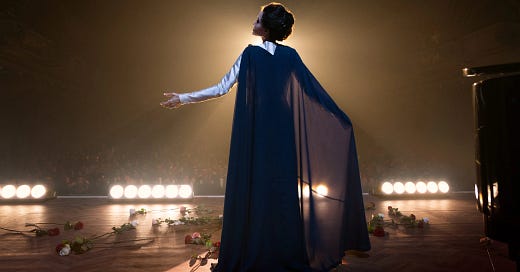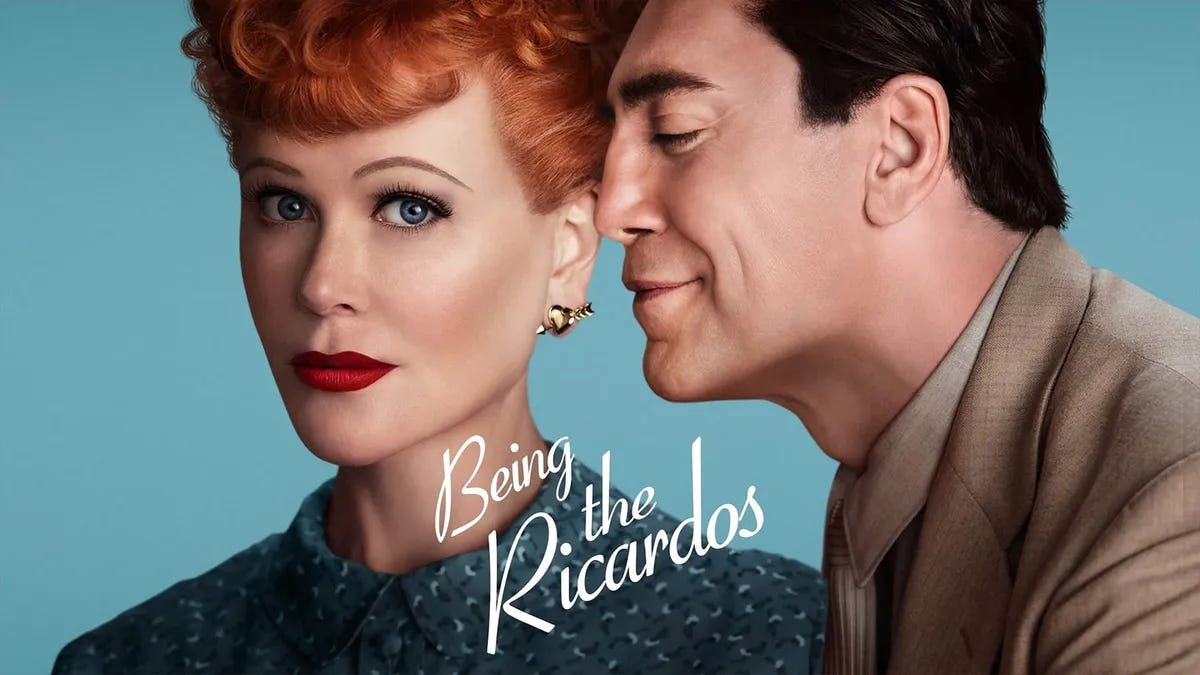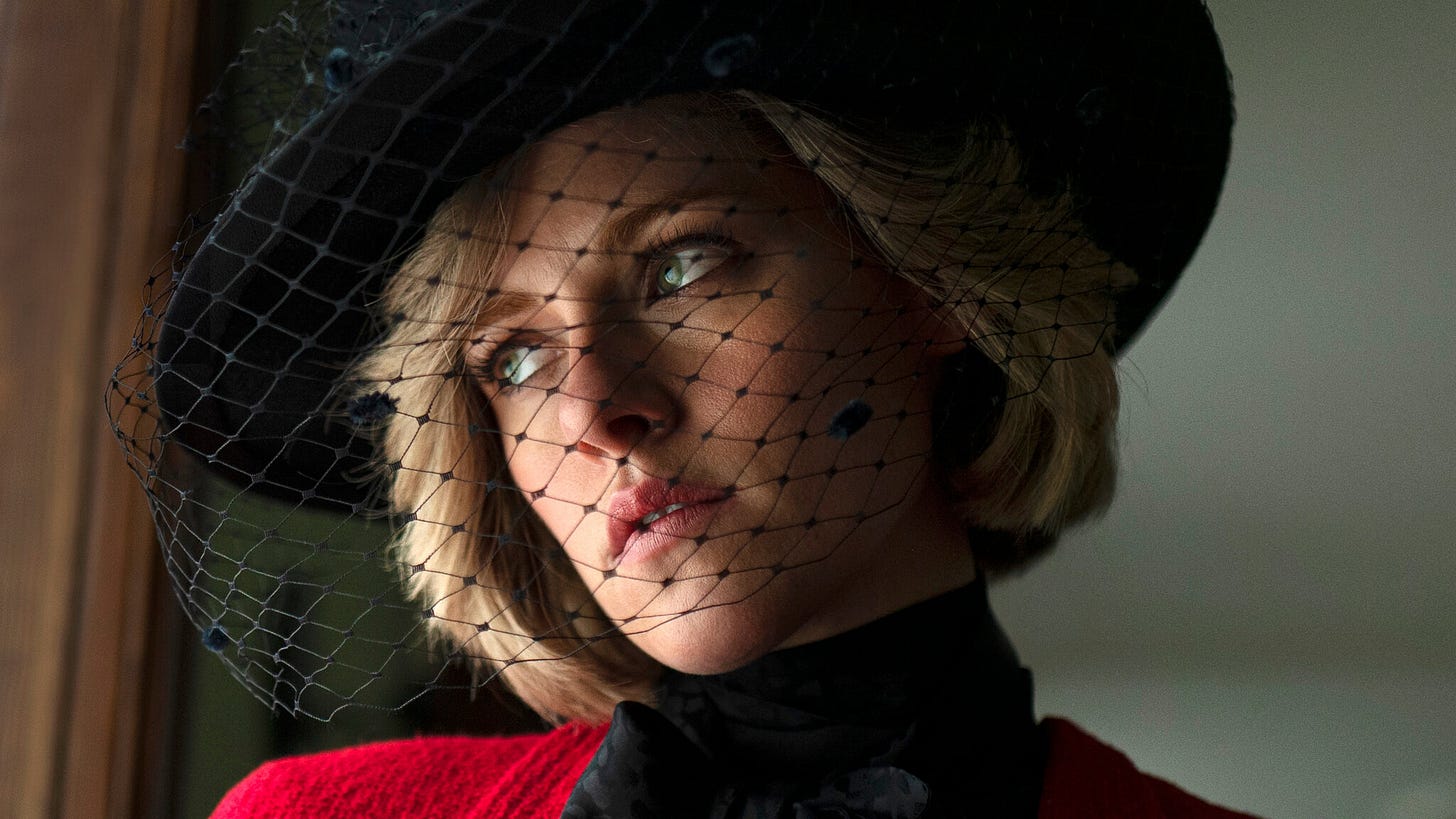the new biopic: a moment, not a life
are we replacing the life story for the snapshot of one, and does this make biopics better or worse?
In recent years, a new trend has emerged with biographical drama films. Instead of covering a public figure’s life in full, they mostly capture a small moment for their subject. This moment could be anything, but it’s usually something specific and notable. It could be the days before their death, a particularly news-worthy week, or a defining moment in their career.
Focusing your script on a particular moment rather than stretching it across time seems promising. The disastrous results of films like Bohemian Rhapsody (2018) and Back to Black (2024), made by people who utterly failed to understand their subject matter or portray their lives in accurate, nuanced, and interesting ways, serve as a reminder of why the phrase “biopic fatigue” has become so popular. Don’t get me wrong, biopics can be excellent. Selena (1997), I, Tonya (2017), Priscilla (2023), Frida (2002), and The Iron Claw (2023) are among my favorite films. But with at least one or more biopics vying for Oscar gold each year, it’s no secret biopics are easy money and attention, inheriting an audience from the notoriety of their subject rather than the promise of their subject matter. Everyone wants to know the life stories of their favorite celebrities so why not settle for the cradle-grave formula, use their name or the name of their most famous work as the title, and call it a day?
Because (some) directors have realized that’s boring. Instead of cramming a sprawling life story into two and a half hours, why not focus on a particular moment? Why not create a riveting psychological profile instead of a schlocky melodrama that’s been glossed over with Hollywood shine? 2005’s Capote was arguably the first to do this, following Truman Capote’s work on his most famous novel, In Cold Blood. Mark Zuckerberg was next with The Social Network (2010), chronicling Facebook’s conception, meteoric rise in popularity, and the lawsuit between Zuckerberg and former co-founder Eduardo Saverin. Both films were critically acclaimed, and considered career bests for both stars and directors. A new trend seemed to be slowly growing.
With the recent releases of films like Being the Ricardos (2021), Spencer (2021), and Maria (2024), the biopic-as-contained-character study seems to have officially caught on. But is this formula any better? Does it provide more room for a better portrayal? Are these films even aiming for an accurate portrayal, or are they more concerned with providing the audience with a specific theme or mood? Are they “high art” or do they think their stylization, cinematography, and high-profile stars will fool audiences into thinking so?
Being the Ricardos (2021) dir. Aaron Sorkin
Being the Ricardos tells the story of I Love Lucy stars Lucille Ball and Desi Arnaz through one hellish production week of their show in 1952. Just as famous for their off-screen marriage as their on-screen one, the film explores their relationship and the work it takes to build a Hollywood empire.
Three main events unfold during the film’s portrayal of this production week:
Lucille is suspicious of Desi having an affair, and her fears are only worsened by constant press gossip.
Lucille has been accused of having ties with the Communist Party, which could end her career.
The show could be shut down soon anyway because Lucille is newly pregnant, and though she and Desi suggest writing her pregnancy into the show, the word “pregnant” isn’t even allowed to be spoken on TV.
Throughout this week, we get a portrait of the famous couple as a unit and as individuals. Lucille is America’s most hilarious housewife but off-screen, she’s meticulous, critical, and relentless to make her work the best it can be–something that 1950s Hollywood doesn’t appreciate. Desi is fighting to get more credit for his work on the show; despite consistently coming up with great ideas and being half the brains behind the whole thing, executives don’t take too kindly to a Cuban calling all the shots. Behind closed doors, the pair’s marriage is teetering. They love and support each other dearly, but their professional lives and personal shortcomings are taking a toll.
The choice to portray this production week is the film’s strongest point. In reality, the three events depicted happened years apart and didn’t happen exactly as portrayed. But condensing these events is not only narratively interesting, it emphasizes just how much pressure Ball and Arnaz were under as Hollywood’s most famous couple. You can feel every moment’s weight, intensity, and fast pace. I Love Lucy changed the industry so much that seeing a portrayal of an episode coming to life combined with the most notorious parts of its stars’ personalities and private lives is where the real heart of the story lays, a few (what I deem to be) inconsequential inaccuracies be damned.
The film does have its glaring issues and for people who don’t know much about Ball and Arnaz, they could walk away believing all of this stuff really happened as written. But as with any biopic, you should go into it knowing you won’t get a completely accurate story. Some things need to be sacrificed to serve the narrative, and maybe Aaron Sorkin sacrificed a little too much for some people. Ball’s friend Stu Shostack criticized the portrayals and called the film a disgrace to their legacy. Lucille and Desi’s daughter Lucie Arnaz, however, said of the film, “For what [the film] is, it encapsulates an awful lot of important information. And he did do a great job sort of inventing this story that is not exactly accurate as far as historical things, but just the essence of how they related to one another is absolutely perfect.”
Spencer (2021) dir. Pablo Larrain
Spencer is about Princess Diana, but it’s not strictly a biopic. Instead, it’s “a fable from a true tragedy.” The film takes place during Christmas 1991 when Diana and the royal family have their annual holiday dinner at Sandringham House. A character study of Diana during her most fragile mental state, the film is imagined as the moment that brings Diana to the tipping point and makes her decide to divorce Prince Charles.
The film opens with Diana driving by herself to Sandringham House and stopping at a local cafe to ask for directions when she gets lost, of course making everyone in the cafe awestruck. It may look like she’s forgotten she’s a princess and can’t do normal things like this anymore, but it’s the opposite: she does these things because she knows she’s not a normal woman anymore. She knows she’s under constant watch and rebels against the Crown’s strict attitudes in various ways, from chatting with house staff, wandering off alone, refusing to wear the right outfits, and leaving her curtains open even when there are reports of gossip rag photographers. These are the actions of a woman who has had enough, and I wish the film gave us more of this Diana.
The film clings to its notion that it’s a fable, saying it can bend and break and stretch the truth because it’s not meant to be taken literally. But the film is sprinkled with true moments from Diana’s life, all condensed into its 3-day time frame. Examples include Charles giving the same jewelry to Diana and his mistress, Diana attempting to throw herself down the stairs, and Diana’s struggles with bulimia. It was crafted to be an intense, surreal, psychological portrait of a woman in duress, but blending Diana’s real life with these exaggerated portrayals only does her a disservice.
All this film wants you to see is the Diana who is struggling. There’s a laughably bad and offensive scene of Diana talking to a hallucination of Anne Boleyn. Look, I’m no fan of Charles either, but saying he’s the same as Henry VIII, who had Anne Boleyn beheaded so he could remarry? Diabolical. But most offensive is the scenes that take liberty with Diana’s mental health struggles, repeatedly showing her hallucinating, self-harming, and having bulimic episodes to an excess that seems exploitative. Diana herself was open about her struggles and never wanted her imperfections to be downplayed. But this Aronofsky (derogatory) impersonation was more interested in creating a Diana fan fiction rather than a nuanced, thoughtful portrayal of a complicated woman during a stressful time in her life. “Fable” or not, you’re still using a real woman’s life as inspiration, tarnishing her memory and refusing to let her rest. The gorgeous cinematography and beautiful score cannot hide a bad script.
Maria (2024) dir. Pablo Larrain
Pablo Larrain is a repeat offender. Maria follows famed opera singer Maria Callas during the last week of her life in 1977. Having lived in seclusion in her Paris apartment since her last performance years ago, she decides to try finding her voice again and eventually return to performing.
The film starts with her death and flashes back to the beginning of the week when we see a lonely Maria starving herself and taking sedatives to get through the day. Her butler and housemaid implore her to eat, call her doctor, take better care of herself. But retrieving her voice interests Maria more, when she’s not lost in hallucinations. Yes, Larrain has again attempted to make a quasi-surrealist film. Under the influence of the sedatives, Maria hallucinates an interview where combined with flashbacks, we learn more about her life. She’s most clear-headed when she’s practicing with her accompanist, who tells her he sees Maria, but wants to see La Callas, and believes she is still in there somewhere.
What could’ve been a rich, emotional portrait of a woman reintroducing herself to her art is instead a middling attempt at showing us Maria the artist, Maria the person, and Maria the celebrity. Unlike Spencer, the film is (thankfully) not gratuitous in its focus on Maria’s personal life, but it can’t ignore it, either. Through the hallucinatory reminiscences, we learn about Maria’s upbringing, first marriage, rise to fame, and her relationship with Aristotle Onassis. The film wastes a lot of time on the latter, and disappointingly so, because for a moment there, it did make an interesting connection between her relationship with Onassis to her relationship with the public–they both think they own her and break her down because of it.
But, as with most of the film’s subject matter, it doesn’t go deep enough and spends time on various things without connecting them very well. An excellent point was made about how when Maria’s body could no longer give the public what they wanted, they turned on her. Maria’s relationship with her body is complex–she lost a lot of weight, experienced failing health, and can’t perform like she used to. The mental and physical strain of opera represents how reaching perfectionism often looks ugly. But this isn’t explored in full, and frustratingly so, because the most interesting thing about Maria Callas is, for better and for worse, how meticulous she is with her craft, and the film is at its best when it remembers this.
I don’t think Maria’s personal life has to be ignored, and neither should the spectacle of her celebrity. In fact, some of it is required in order to understand her as an artist. All of these parts make up Maria Callas, after all. Somewhere, underneath the earnest yet shallow script, is a film that expertly connects Maria’s relationships to her body, herself, her art, her fame, and her life to create a psychological portrait of an artist and misunderstood woman. Angelina Jolie certainly gave a performance that wanted to do that.
so where do we go from here?
Ultimately, while I think this new format for biopics can make for more interesting stories, their pitfalls are the same as any other biopic. When creating a story about a real person, you cannot escape the fact that at the end of the day, you don’t really know who they are, no matter what primary sources you have. You are creating a character, just like with fiction. Biopics may claim to get to the person behind the persona, but they are just another cog in the machine that serves to live off the name of celebrities who, more often than not, are dead and cannot speak for themselves anymore.
That’s not to write off biopics as a whole. But I think only a few biopics have been made well and in good taste. Attempts to change the formula have been a mixed bag, with many showing promise only to fall into some of the same tropes. You cannot escape the entirety of a celebrity’s life completely; their past must inform the present that you are showing the audience.
In some cases, this means the film does use flashbacks to varying degrees of success. In others, it means they disregard context and create an ill-informed piece (some of the time: we definitely didn’t need to know about Zuck’s entire life in The Social Network and thank god the film understood that). And just like with any film, you cannot rely on pretty visuals and A-list actors to trick people into thinking you’re not doing the same thing as a cheesy Lifetime biopic: capitalizing off of someone’s story.
Again, that’s not to say I don’t like biopics, but no matter how good someone’s intentions are, they need to ask themselves if telling someone else’s story is a) necessary and b) the appropriate time. A good example is Selena. Though it was released just two years after her death, it was made by her family and arguably helped Selena Quintanilla-Perez achieve the international fame she would’ve gotten had she lived. But more importantly, it was an honest, well-crafted tribute. A bad example is Spencer. Diana died less than thirty years ago and her family, friends, and colleagues are all alive and well to see the stuff made about her. Creating such a fictionalized portrait around an imagined moment in time does a disservice to Diana as a whole person. With so much information about her readily available, the film is useless.
At the end of the day, that’s still the core issue with biopics, no matter how they try to change up the formula: are they really necessary? Would the subject of your biopic even want it to be made? What can a biopic say that a celebrity’s own words can’t? There’s nothing in Being the Ricardos that you can’t read in Lucille Ball’s autobiography, Love, Lucy, or watch in the several documentaries about her and her husband. Biopics are not going away; they make too much money. Sometimes a dramatized life story is more entertaining than a documentary, or it can introduce new fans. Rarely does it offer a new, interesting, or even wanted perspective, and it looks like that will still be the case for the time being.
Thanks for reading! What are some biopics you love? Some you hate? Do you have any ideas for improving the genre? Let me know in the comments!
In the meantime…
If you liked this post, please press ‘like’, leave a comment, share this post, or subscribe to my newsletter for free. To see what I get up to when I’m not writing, you can follow me on Instagram at mjewrites.







I appreciate this take so much!! And I love the thought you put into it. I hadn't quite noticed this trend until you mentioned it, but you're absolutely right that it's been so big lately. From a writing perspective, I'd say it does help contain the story a bit and focus it, but there's so much more creative liberty taken. There's a fine line to walk, and I'm interested to see how filmmakers continue to navigate it in the future!
Hmm let me think…. I guess the social network would be one of the only biopics I’ve seen. Wait I liked goodfellas if that counts but it probably doesn’t because the subject who it is based on helped write the film and it was based the book he wrote. I guess im just not a biopic person but I do plan on seeing Priscilla.